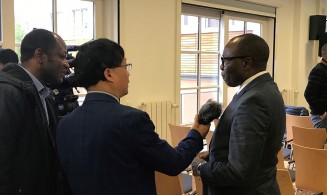

Advocating for Adult Learning and Education in sub-Saharan Africa
advocating-for-adult-education.jpg

The third Global Report on Adult Learning and Education (GRALE 3) was launched in sub-Saharan Africa at a meeting held on 14 November 2016 in Ouagadougou, Burkina Faso. Launching the report, experts from the UNESCO Institute for Lifelong Learning (UIL) presented analyses and recommendations on adult learning and education (ALE) in the region.
The progress of ALE in sub-Saharan Africa
Drawing on survey findings of 139 countries, including 33 from sub-Saharan Africa (SSA), GRALE 3 found progress in ALE in the region to be mixed. This finding is in response to pledges made by individual countries to improve ALE policies and practices in the 2009 Belém Framework for Action.
Specific findings include:
- Seventy-eight per cent of countries in SSA report that their ALE policies have improved since 2009
- Seven SSA countries say that funding for ALE has decreased during the same period
- SSA suffers from high rates of adult illiteracy, with women affected disproportionately
Recommendation on Adult Learning and Education
This important regional launch of GRALE 3 took place as part of the 2016 International Council for Adult Education (ICAE) Academy of Lifelong Learning Advocacy (IALLA), an annual training programme that helps leaders and activists acquire the knowledge, advocacy skills and networks they need to promote ALE. The event was co-organized by ICAE, the Swiss Agency for Development and Cooperation (SDC) and UIL, bringing participants from the region and beyond.
Participants also discussed how ALE can contribute to the achievement of the 2030 Sustainable Development Goals, in view of the new Recommendation on Adult Learning and Education (RALE - 2015). They considered compelling evidence from GRALE 3 on the impact of ALE in three major policy domains highlighted in the report: health and wellbeing; employment and the labour market; and social, civic and community life. They concluded that RALE offers a comprehensive new framework that, if used together with GRALE 3, can help countries promote and improve ALE policies and practices.













